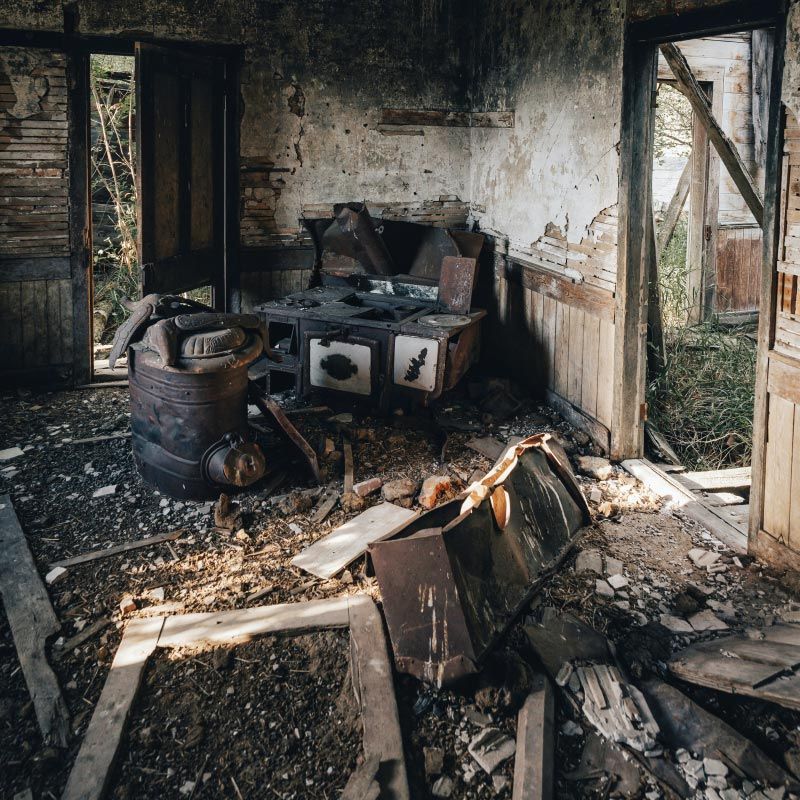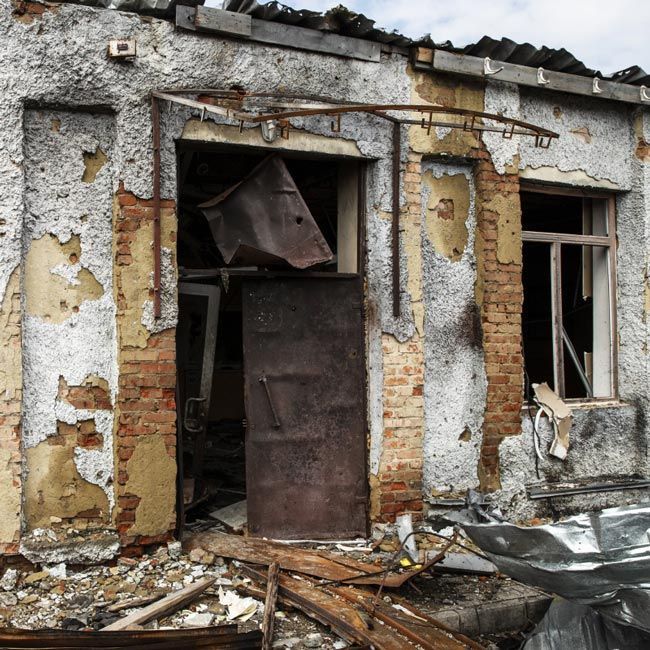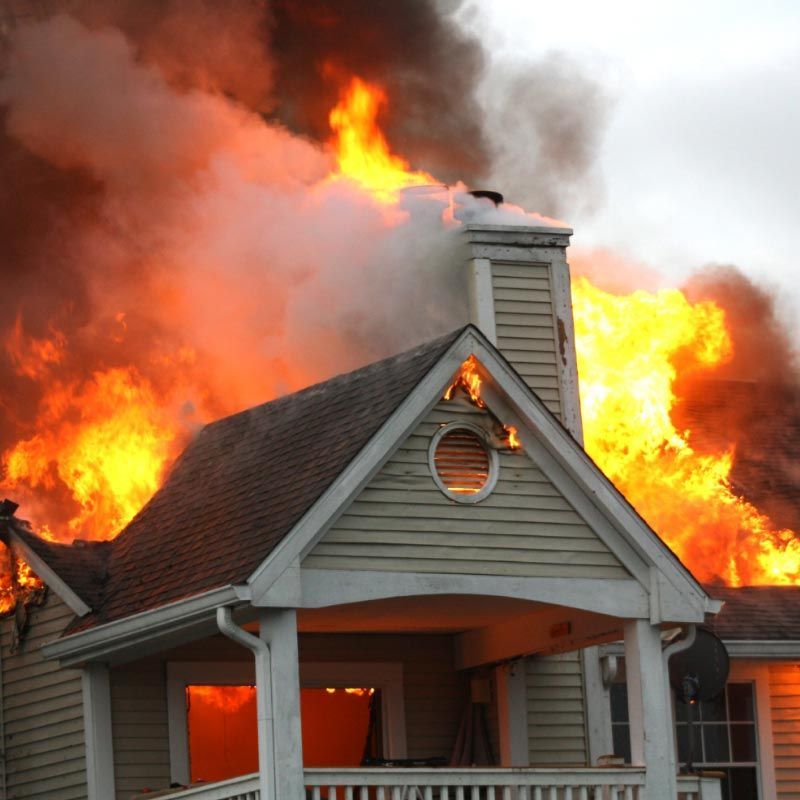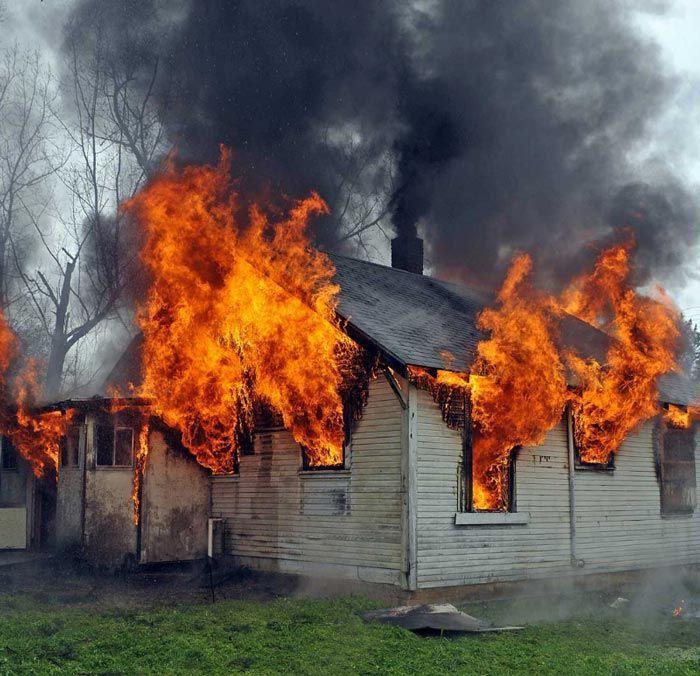When to Get a Lawyer After a House Fire Explained
Free Offer Form
We will get back to you as soon as possible.
Please try again later.
The fire insurance claim process can be confusing. It can be even more stressful if you end up injured or with much property damage after an especially serious fire.
After the fire, you might already know to document the property damage and contact your insurer to start the fire insurance claim process immediately.
But should I get a lawyer after a house fire too?
Yes, it's a good idea to get a lawyer who can
help you through the intricacies of insurance claims. Below, we'll discuss why homeowners should hire an attorney after home fires.
Exploring Legal Representation Post House Fire
This section will explore why having legal representation after a house fire is a good idea.
How Lawyers Assist with Fire Damage Claims
A lawyer can prevent you from experiencing additional damage or loss. They can do this by negotiating with your insurance company or even arguing the case in court if needed.
They can help you through the fire insurance claims process, which also means you won't need to deal with the company by yourself.
The Consequence of Legal Aid in Claims Navigation
Lawyers help you compile evidence of things like personal injury, property loss, and wrongful death to prove that the fire directly caused them.
They also act with your best interests in mind, ensuring you reach a fair settlement with your insurer.
Securing Fair Compensation: Lawyer's Role
A lawyer can help ensure you receive your full insurance policy payout so you can reduce your out-of-pocket expenses by as much as possible.
If there's still some money left even after your claim is settled, an attorney can ensure that it gets returned to you rather than pocketed by the insurance company.
Can I Sell a Fire Damaged House National?
Yes. You can sell a fire-damaged house. However, it may be harder to sell in the local National real estate market in as-is condition. You would have to make repairs and possibly rebuild most parts of your house before a buyer takes interest in the property. Your best option when selling a fire-damaged house is a cash buyer. They buy burned houses as-is so you don't need to spend money on repairs. They'll handle all the cleanups and renovations for you, however, expect that their offer may be below the cash value of your property.
Breaking Down Fire Damage Claims
Bringing in a Fire Damage Assessment Expert
Fire-damaged home rebuilding is expensive. In fact, restoring a fire-damaged house cost can reach as high as $46,000 or more, depending on the extent of the damage.
As such, getting the full amount from your insurance policy can be a huge help.
Damages Eligible for Claims
Homeowners expect to get some (if not all) of their home-repairing funds from their fire insurance claim. Below are some damages you can claim.
Property Damage
Property value post-fire is negatively affected by the damage the house fire caused.
It's also worth noting that the fire department may actually cause more damage than the fire — most notably in the form of water damage.
Regardless, ask the fire department to file an initial report on the cause of the fire. These reports contain important details that can help in property damage claims.
Personal Injuries
If you suffered injuries from the fire, you can be reimbursed for medical bills, pain, and disability.
Say you suffered from carbon monoxide poisoning because of smoke inhalation or a broken leg because of falling debris. In such instances, a personal injury lawyer can be of help here.
Emotional Distress
Emotional distress is also eligible for claims. For example, you sustained emotional injury from witnessing a wrongful death or another person suffering because of the fire.
Income Disruption
You can recover your loss of income if the fire damage hinders you from going to work. In such cases, the insurance agent can help determine the coverage you can get.
Home Loss
You can recover some or all of your losses if a fire damages or destroys your house.
Similar to "income disruption" above, an agent can help determine the kind of coverage you can get — while still considering your possessions and their sentimental value.
Structural Impairment
If structural damage was caused by fire, smoke, and water damage from a house fire, then you can start a claims process for structural fire damage — which includes coverage for repairs and renovation costs.
Cleanup Expenditure
Extensive soot and smoke damage can be especially expensive to clean up. The expenses for cleaning up after a fire can be included in your structural damage claim.
Interim Housing Expenses
If the fire damage has left your house completely uninhabitable, you can be reimbursed for temporary housing expenses.
These may include hotel bills, rent, or staying with a family or friend while your house is being renovated.
Filing a Fire Damage Claim: The Procedure
An experienced lawyer can help you during the fire damage insurance claim process. However, knowing what to expect can make the process smoother.
Below are general steps you can follow when claiming insurance after house fire:
- Thoroughly document the damage since the more proof you have, the easier it can be to get your claims accepted.
- Secure your home from sustaining additional damage. However, don't start reconstruction or restoration until your claim is filed.
- Call your insurance company to start the insurance claim process. Insurance adjusters must be sent to damaged properties within 15 days to check the damage and estimate how much repairs may cost.
- Wait for your company to contact you, but they should respond to your claim within a reasonable amount of time. Follow up if it's taking too long.
- If your claim is accepted, you should receive the money within the next 5 business days. If your claim is rejected, the company must give an explanation in writing.
IMPORTANT: Document all your interactions with the insurance company. Record the date, time, and content of phone calls, letters, and emails. These can come in handy if you have a dispute with them.
Interaction with Insurance Companies Post House Fire
Your insurer will provide you with funds to cover things like fire damage and your personal needs while you're displaced.
For a smoother fire insurance claim process, you should know what to expect when interacting with them.
Do Insurance Firms Employ Lawyers?
Yes, all insurance firms employ lawyers — they may be in-house counsel in charge of legal matters or contracted outside law firms.
The insurance industry is heavily regulated, so companies will need legal guidance from lawyers who are updated on handling any legal process, like insurance litigation.
What to Anticipate from Your Insurer
Some information to include in your claim are:
- Date of loss
- Type of loss/damage
- Related injuries
- Necessary temporary repairs
- Police and/or fire department report
Your insurer might request certain legal documents in the future, such as insurance forms, correspondences, and contracts for repairs.
Your lawyer can help you keep track of what you need to compile.
Lawyer's Role in Insurance Company Negotiations
An insurance company's attorney advises them on how they can stay within the law. That's because their lawyers should be familiar with state and federal laws and how they apply to the company.
Aside from that, lawyers can also represent the company in court if needed.
The Process of Selling Fire Damaged Property to a Cash Buyer
The process of getting a cash offer for a burned house is pretty much the same as any property type. However, it is best if you can contact your home insurance company first before getting an offer for your house after a fire. Your National home insurance company can help assess the extent of the fire damage as well as the repair costs. This can help you decide whether selling a house as-is to a cash buyer is really the right path to take. Once you have decided that you really want to get a cash offer, here are the next steps you should take.
Important note: This doesn't apply to all cash buying companies.
1. Request a Cash Offer
You can easily find cash buyers in your National area by searching online. Once you found a reputable cash buyer, head over to their website to fill out a form or give them a call to ask for a cash offer. Most cash buyers and real estate investors give no-obligation cash offers so you can still ask other cash buying companies how much they can buy your fire-damaged property. If you are unsure about the background of a cash buyer, you can always ask them for proof of their source of funds.
2. Welcome the Cash Buyer into Your Home
The cash buyer or real estate investor may want to check your fire-damaged property for the repairs and improvements it needs, especially its roofing, walls, foundation, etc. You won't have to pay for these repairs when selling a National house to them, but experienced home buyers or real estate investors consider repair costs to make an accurate cash offer.
3. Review the Contract and Sign
Once you accept the cash buyer's offer on your fire-damaged home, they would furnish a sales contract and send it to you electronically. You will be given time to go over the terms and ask questions. After everything is settled, sign the contract to make the deal with the National cash home buyer official.
4. Closing
During closing, expect less paperwork since there are no lenders involved. After you have signed the minimal necessary paperwork and the National deed is transferred to the cash buyer's name, you'll get your cash in your bank account. If you aren't confident attending the closing by yourself, bring a real estate attorney with you.
5. Set Your Preferred Day to Move-Out
If the property has minor fire damage and you are still living in it, communicate to the cash home buyer when you want to move out. This is also a good time to ask for a sale-leaseback agreement if you don't have a place to crash on while you are still looking for a new National home.
Securing Legal Counsel Post House Fire
A devastating event can leave a person confused and overwhelmed. Fortunately, a legal representative will make it their business to help their clients with insurance claims and ensure they get a fair settlement.
Determining When to Consult a Lawyer
You should contact a personal injury lawyer immediately if you sustained a house fire injury. Other times to call an attorney are:
- When the fire was caused by someone's negligence — whether because of faulty wiring or a landlord not meeting fire safety standards.
- If you need to pay medical bills because of the fire.
- If the insurance company isn't offering enough compensation.
- If the fire led to a wrongful death.
- If you feel that the fire department didn't do everything it could to stop the spread of the fire.
Expenses Involved in Hiring a Fire Claim Lawyer
You can expect to pay $125- $350 an hour for most attorneys. However, the price differs on factors such as how complex your case is and whether or not you go to court.
If you end up in litigation, you'll also need to pay for retainer legal fees.
Crucial Inquiries While Hiring a Lawyer
You'll want to hire an experienced attorney who you're sure will act with your best interests in mind. Below are some questions to ask your prospective attorneys:
- What types of cases have you handled in the past concerning insurance companies?
- If so, do you handle cases involving homeowners' policies, renters' policies, or both?
- How much experience do you have representing people who were injured by fire?
- What types of settlements have you won?
- How many cases have you settled out of court?
You can know more about them after a background check. Get in touch with their past clients and see what they can say about the lawyer.
Fire Safety and Mitigation
Apart from asking, "Should I get a lawyer after a house fire" it's ideal to learn fire safety practices.
A big part of fire safety is awareness of its leading causes and knowing what to do when fires break out.
Frequent Origins and Sites of House Fires
The most common cause of house fires is cooking, like leaving the stove unattended. Other leading causes include:
- Heating
- Smoking
- Faulty electrical equipment
- Unattended candles
A homeowner's or landlord's insurance policy may cover fire damages from the above causes. However, if it's a house fire by tenant accident, the tenant might have to cover the damages.
Immediate Actions Post House Fire
Immediate steps after a house fire include:
- Find a safe place to stay and tell your family you're safe.
- Document the fire damage.
- Contact your insurance company and start the fire insurance claim process.
- When the fire department deems your property safe to be entered, see what you can salvage from your items.
- Replace important papers like family records, insurance policies, mortgage papers, vehicle titles, and other legal documents.
Preventive Measures for Future House Fires
Some residential fires could've been prevented if the proper fire safety measures were in place.
Fortunately, avoiding house fires is actually quite simple. Below are a few tips to minimize the chances of experiencing a fire:
- Safely store lighters and matches.
- Don't smoke near anything flammable, like the bed or near curtains.
- Don't leave cigarettes, candles, and stoves unattended.
- Have good smoke detector placement in home, such as putting one on every level.
Check the smoke alarms monthly.
Potential Legal Disputes and Resolutions
Even with an attorney, you should still be aware of possible legal issues and processes involved in claiming insurance for house fires.
Common Legal Issues After a House Fire
There are many types of fire damage lawsuits concerning residential fires — from electrical fires to gas and explosion fires.
Aside from knowing the type of fire, you should also know who should be held responsible for the fire.
The landlord's role post-fire typically includes repairing structural damage, providing temporary accommodation, and dealing with lost possessions.
But ultimately, whoever is responsible for the fire will be the one you'll have to sue for property damage.
Navigating Lawsuits Related to Fire Damage
Lawsuits can take months to years of negotiation and litigation.
It can be handy for property owners, insurers, and attorneys alike to look at past legal precedents to get good insights into what factors courts look at when they determine liability and compensation.
For instance, looking at related cases can provide you with an idea of your neighbor's liability for fire damage if your neighbor's fire spreads to your property.
If it was found that your neighbor's negligence caused the fire, your insurer can sue them for the fire damage.
Role of a Lawyer in Court Proceedings
A fire damage attorney can protect your legal rights and help you figure out if you have a valid claim.
Personal injury attorneys should show that there's a direct relationship between the fire and your injuries.
An attorney can help you take legal action if you think your claims have been
unjustly denied or you suspect unlawful mishandling.
Understanding Insurance Policies
Experienced attorneys can help you understand the fine print of your insurance coverage.
However, it's also a good idea to familiarize yourself with some of the jargon you can expect to find in your policy.
Decoding Homeowner's Insurance Terms
Some essential homeowner's insurance terms you should know are:
- Deductible - This is how you, the policyholder, and your insurance carrier share the cost of coverage. It's the amount you must pay before making any insurance claim or reimbursement.
- Liability insurance - This protects you and your family from legal claims from injuries that occur on your property.
- Dwelling protection - With this, your policy can help pay for the rebuilding or repairing of structures damaged by covered hazards, like house fires.
- Actual cash value (ACV) - This refers to the actual value of your damaged or lost property at the time it was damaged or lost. It takes depreciation into account.
- Additional living expense - If your house is uninhabitable while it's being repaired, this coverage can pay for your needs, such as temporary housing and clothes.
Understanding Policy Coverage and Exclusions
There are four main parts of an insurance contract:
- Declaration page - Here, you'll find the name of the policyholder, the risks or property that are covered, policy limits, and the policy period.
- Insuring agreement - This part summarizes the insurer's major promises (such as providing certain services) and the policy coverage.
- Exclusions - You'll find excluded perils or causes of loss, losses, and property that the policy won't cover.
- Conditions - These qualify or place coverage limits on the policy.
Role of a Lawyer in Policy Interpretation
Lawyers are familiar with federal and state laws and how it affects insurance companies and policyholders. They're also trained to read and understand the fine print of contracts.
Thanks to that, they can also help you more easily understand the terms of your contract.
Frequently Asked Questions
An attorney can be a great help in claiming your coverage from the insurer. Below are more questions that can also help you in claiming insurance.
Should I Hire a Lawyer After a House Fire?
Yes, it's a good idea to get a lawyer after a house fire since they can help you through the insurance claim process if you don't think you can handle it yourself.
However, it's all the more important to hire a lawyer if the fire wasn't your fault, if you think your insurance claim was unjustly denied, or if you suspect unlawful mishandling of your claim.
What Can I Claim for After a House Fire?
You can claim for the following after a residential fire:
- Property damage
- Personal injuries
- Emotional Distress
- Income Disruption
- Home Loss
- Structural Impairment
- Cleanup Expenditure
- Interim Housing Expenses
How Can a Lawyer Help Me Deal with My Insurance Company After a House Fire?
A lawyer can help you through the fire damage claim process. This includes compiling evidence, explaining your legal rights, and coming up with an estimated value for your insured losses.
Note that house fire insurance adjuster dealings can be difficult — especially since adjusters work for the insurance company, so unscrupulous adjusters might give inaccurate assessments regarding the extent of the fire damage.
Lawyers can ensure that homeowners receive maximum compensation. Any negotiations can also be handled professionally by lawyers.
How Much Does It Cost to Hire a Lawyer for a Fire Damage Insurance Claim?
It can cost $125-$350 an hour to hire an attorney. This changes based on factors like your case's complexity and if you have to go to court.
However, if you choose litigation, insurance companies will pay the hired lawyer fees if you win the settlement or judgment.
What Are Some Fire Safety Tips to Prevent Future House Fires?
Some fire safety tips to prevent future house fires include:
- Ensure fire safety devices (like smoke and carbon monoxide detectors) work.
- Keep flammable items (like paint and curtains) away from heat sources like candles and space heaters.
- Don't leave your cooking unattended.
- Ensure that electrical appliances are in good working condition and not overloaded.
Conclusion
Having legal representation after a house fire can help you claim insurance from your insurer.
They can also help you understand your insurance coverage policy more and protect you if your fire damage claim was unjustly denied.
However, even with legal help, you should still aim to understand the claiming process and related jargon yourself.
On top of that, practice fire prevention tips to lower the chances of you experiencing a fire again.
National Resources
- Selling a Fire Damaged House National
- Selling Inherited Property National
- Selling a House in Probate National
- How to Sell a House by Owner National
- How to Sell Rental Property National
- Stop Foreclosure National
- Selling a House during Divorce National
- How to Sell a Hoarder House National
- Can You Sell a Condemned House National?
- Can You Sell a House in Foreclosure National?
- How to Sell Rental Property with Tenants National
- Taxes on Selling a House National
Free Offer Form
We will get back to you as soon as possible.
Please try again later.
Author: Chris Charles
We buy fire damaged houses because we like taking on the challenge and making a win win for sellers looking to sell. We work with our partners nationwide and are experienced in dealing with the city if its already been condemned. Request a cash offer to have a chat with us today.
Sell Fire Damaged House for Cash Quick
Sell Your House Fast, To A Legitimate House Buying Company You Can Count On. ✔️ Free, Easy & ✔️ No Pressure Process. Find Out How We Buy Houses!
Sell Fire Damage House in California
Sell Fire Damaged House in Ohio
Sell Fire Damaged House In North Carolina
Sell Fire Damaged House In Michigan
Sell Fire Damaged House In Massachusetts
Sell Fire Damaged House In Colorado
Sell Fire Damaged House In Minnesota
Sell Fire Damaged House In South Carolina
Sell Fire Damaged House In Alabama
Sell Fire Damaged House In Louisiana
Sell Fire Damaged House In New Hampshire
Sell Fire Damaged House In Maine
Sell Fire Damage House in Texas
Sell Fire Damaged House in Florida
Sell Fire Damaged House In New Jersey
Sell Fire Damaged House In Virginia
Sell Fire Damaged House In Indiana
Sell Fire Damaged House In Kentucky
Sell Fire Damaged House In Oregon
Sell Fire Damaged House In Oklahoma
Sell Fire Damaged House In Connecticut
Sell Fire Damaged House In Utah
Sell Fire Damaged House In Rhode Island
Sell Fire Damaged House In Delaware
Sell Fire Damaged House in Pennsylvania
Sell Fire Damaged House in New York
Sell Fire Damaged House In Washington
Sell Fire Damaged House In Arizona
Sell Fire Damaged House In Missouri
Sell Fire Damaged House In Nevada
Sell Fire Damaged House In Iowa
Sell Fire Damaged House In Arkansas
Sell Fire Damaged House In Mississippi
Sell Fire Damaged House In Kansas
Sell Fire Damaged House In North Dakota
Sell Fire Damaged House In Alaska
Sell Fire Damaged House in Georgia
Sell Fire Damaged House in Illinois
Sell Fire Damaged House In Tennessee
Sell Fire Damaged House In Maryland
Sell Fire Damaged House In Wisconsin
Sell Fire Damaged House In New Mexico
Sell Fire Damaged House In Idaho
Sell Fire Damaged House In Nebraska
Sell Fire Damaged House In West Virginia
Sell Fire Damaged House In Hawaii
Sell Fire Damaged House In Vermont






